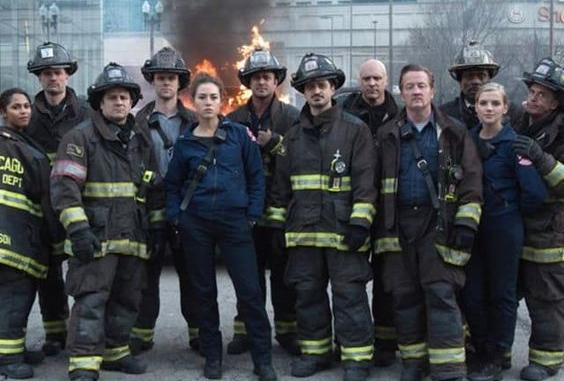
Chicago Fire Season 13 Immediately Explained Why Archer’s Big Med Meltdown Felt Emotionally Empty
“Chicago Fire” has long been lauded for its ability to deliver emotionally charged storylines that resonate with viewers, tapping into the raw vulnerability and heroism of its characters. However, Season 13 introduced a narrative arc centered around Dr. Dean Archer that, despite its potential for dramatic impact, ultimately fell flat. Archer’s much-anticipated medical meltdown, a moment intended to showcase his internal struggles and vulnerability, resonated with an emotional emptiness that left many viewers feeling disconnected. This begs the question: why did this pivotal moment fail to land, and what factors contributed to its emotional hollowness?
The failure of Archer’s meltdown to connect with audiences wasn’t due to a lack of effort or dramatic staging. Instead, it stemmed from a confluence of narrative choices, character development missteps, and a fundamental disconnect between the character’s actions and his emotional arc. By dissecting the elements that contributed to this emotional void, we can better understand the complexities of character development and the delicate balance required to create impactful television.
The Disconnect: Archer’s Character Development Issues
One of the primary reasons Archer’s meltdown failed to elicit an emotional response was the character’s inconsistent and often unlikable portrayal throughout previous seasons. While the show attempted to portray him as a complex individual grappling with past trauma and professional pressures, his actions often leaned towards arrogance, stubbornness, and a lack of empathy.
This pattern of behavior created a disconnect between the character and the audience. When his meltdown finally arrived, it felt more like a continuation of his existing flaws than a genuine moment of vulnerability. The audience struggled to empathize with a character who had consistently alienated them with his abrasive demeanor.
Furthermore, the show’s attempts to humanize Archer often felt rushed and superficial. Brief glimpses into his past trauma or fleeting moments of remorse were insufficient to counterbalance his overall negative portrayal. This lack of consistent and meaningful character development prevented viewers from forming a genuine emotional connection with him.
The Lack of Build-Up: An Abrupt Emotional Shift
Another contributing factor to the emotional emptiness of Archer’s meltdown was the lack of sufficient build-up. While the show hinted at his internal struggles, it failed to adequately lay the groundwork for a dramatic emotional release.
The meltdown, when it occurred, felt abrupt and disconnected from the preceding events. It lacked the gradual escalation of tension and the subtle hints of emotional unraveling that are essential for creating a powerful emotional moment.
Instead, the meltdown felt contrived, a dramatic device inserted for shock value rather than a natural culmination of the character’s emotional journey. This lack of organic development prevented viewers from fully investing in Archer’s emotional turmoil.
The Absence of Empathy: A Lack of Relatability
A crucial element of creating impactful emotional moments is relatability. Viewers need to see a reflection of their own experiences and emotions in the characters on screen. However, Archer’s meltdown lacked this essential element of relatability.
His struggles, while potentially valid, were often framed in a way that felt detached from the everyday experiences of viewers. His professional pressures and personal demons were presented as exceptional circumstances, rather than relatable human struggles.
This lack of relatability prevented viewers from connecting with Archer on an emotional level. His meltdown felt like a distant spectacle, rather than a shared experience.
The Missed Opportunities: A Lack of Emotional Depth
“Chicago Fire” has a history of exploring complex emotional themes with nuance and depth. However, Archer’s meltdown lacked this essential emotional depth.
The show missed opportunities to delve into the underlying causes of his emotional turmoil. His past trauma, his professional anxieties, and his personal relationships were treated superficially, rather than explored with the necessary depth and nuance.
This lack of emotional depth prevented viewers from understanding the true extent of Archer’s struggles. His meltdown felt like a surface-level display of emotion, rather than a genuine expression of his inner turmoil.
The Impact on the Narrative: A Missed Emotional Beat
The emotional emptiness of Archer’s meltdown had a significant impact on the overall narrative of Season 13. It created a missed emotional beat, a moment that should have been powerful and impactful but instead fell flat.
This missed opportunity not only affected Archer’s character arc but also impacted the emotional resonance of the surrounding storylines. The lack of emotional investment in Archer’s struggles created a sense of disconnect, preventing viewers from fully engaging with the overall narrative.
The failure to deliver a compelling emotional moment ultimately diminished the impact of Season 13, leaving viewers feeling unsatisfied and emotionally unfulfilled.
Lessons Learned: The Importance of Character Development
Archer’s meltdown serves as a cautionary tale, highlighting the importance of consistent and meaningful character development. It underscores the need to create relatable characters with complex emotional journeys.
To create impactful emotional moments, shows must invest in building genuine connections between characters and viewers. This requires a commitment to exploring the characters’ inner lives, delving into their past experiences, and showcasing their vulnerabilities.
Furthermore, emotional moments must be earned through organic build-up and relatable experiences. They cannot be contrived or inserted for shock value.
Conclusion: A Missed Emotional Connection
Archer’s meltdown in “Chicago Fire” Season 13 ultimately failed to connect with viewers, leaving them feeling emotionally empty. This lack of connection stemmed from a confluence of factors, including inconsistent character development, a lack of build-up, a lack of relatability, and a missed opportunity to explore emotional depth.
This narrative misstep serves as a reminder of the delicate balance required to create impactful television. It underscores the importance of investing in character development, building genuine emotional connections, and delivering emotional moments that resonate with viewers. As “Chicago Fire” moves forward, it must learn from this experience and strive to create more authentic and emotionally fulfilling storylines.